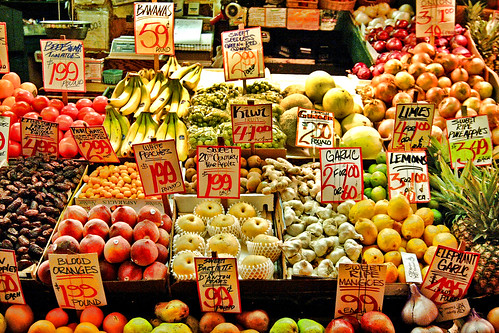
Hi! Welcome to my third installment in my series on money management. (See post one and post two:housing here!) In an effort to spend a bit less and save a bit more, I’m taking a look at my family’s expenses. I started big, and I’m working my way down. However, our second biggest expense – Food – is such a big topic, I think I have the pieces of several posts floating around in my head.
First off, the details. According to the analysis of Mint.com, our family around 20% of our money on food. I’ve done some looking around, and it looks like the average American family spends 5-10% of their income on food…roughly half of that spent on groceries and half spent dining out. So we spend at least twice the average. That’s a lot!
Granted, our Food category is pretty inclusive. At the grocery store, we also purchase things like laundry detergent, diapers, light bulbs, Kleenex and toiletries, so those items are all lumped in with our grocery store purchases. Even so, we spend an average of $160 each week on groceries. Is this crazy? How much does your family spend?

Here’s the rest of the picture. As a family, we spend an average of $6/day eating out. We spend about $4/week at coffee shops (this also includes ice cream at JavaCat!). Over the last year, we paid $2,400 on food outside of the home. Geesh! It felt like we were being judicious in our choices about eating out, but that seems like a lot of money!
As we look for ways to curb spending, our Food category seems like a critical one to examine since it comprises such a big chunk of our overall expenses. We love our food, and for us, the food we eat has a lot to do with our values and the way we want to nourish our family and our world.
I got a master’s degree in Natural Resource Policy and Behavior. As an undergraduate at Carleton, I took classes in sustainable agriculture. In my work at Gathering Waters, I did some work with the Federal Farm Bill. Throughout these experiences, I’ve read and thought and talked extensively about conventional and more sustainable farming practices.
I’ve looked at the history and the current status of the US’s farm policy, and I’m acutely aware of how farm subsidies, school lunch programs, food-stamp programs, and even the food pyramid have in many cases lost the concept of feeding people real, fresh food that’s good for our bodies and our communities. I’ve seen how difficult it is for people to change behaviors. Perhaps most importantly, I’ve learned in my studies that since we live in a capitalist society, if we want things to change, we need to vote with our money. I feel passionately about that. No matter who I elect into office or what education programs I help create, the thing that matters the most is, collectively, the companies we support with our daily dollars.

I want to see a shift away from conglomerate farms. I want farmers to earn a living wage. I want farmers to use good, healthy farming practices. I want lots of products offered in grocery stores that don’t contain trans-fat or high-fructose corn syrup or long lists of words I can’t pronounce. I want to enjoy food that was raised or grown right nearby so I’m not encouraging so much long-distance transport of food and so I can support local farms. I want my kids to know and expect their food to be real, healthy, and tasty. To achieve those goals, I believe that I need to be a conscientious consumer.

Now I want to step back for a moment and give a disclaimer. What I’m hoping to do in this post is to share some of my family’s values, which are then shaping the decisions we are making about how to spend our money. We’ve come to these values over the course of many years, and they are personal and evolving. I think everyone has the right to express their own values – be they political, religious, or of a foodie nature. I just hope that no one read any judgmental tone in any of this, as none is intended.

So back to being a conscientious consumer… Unfortunately, in general, I’ve found that purchasing food and products that promote the values I hold dear means I’m paying a premium. But I’m willing to do it! Since the time I was a young girl in the 1980s and learned about dolphin-safe tuna, I’ve felt that it’s worthwhile to spend a few extra cents to purchase products that are doing good.
Ten years ago, Bryan and I bought all conventionally-produced groceries. We now spend maybe half of our grocery budget on what I’ll call non-traditional food items…things are either organic or local or higher quality. In my next post, I’m going to take a look at some of those items (milk, eggs, diapers, coffee) and look at our budget implications of spending our money this way.
My hope is that if we have to change some of our spending patterns, we can find strategic areas to cut so we can continue to live by our values while saving some money in the near-term.Let me know what you think about all this! How much does your family spend on groceries every week? Are there more expensive things you buy that think are really worth while? What grocery items are most important to you?
I look forward to hearing what you have to say!


Nah, I really haven't influenced Michael that much when it comes to meat (not intentionally anyway). We've just figured out what's about right by trial and error. So he's the one who notes that I haven't divided up the meat portions small enough and we have leftover or we are too full (and this is how we decided that a pound of meat should be divided into thirds). We also have a lot of meatless nights.
Dad- I ate Korean food… At least what wasn't spicy. Jered and Sans, on the other hand….Lisa – if what you are saying is true, I may just have to disown Michael. How could he forget the awesomeness of meat?
I don’t have any sense of how much we spend on groceries a week. I’d suspect it is about $150 for a family of four. We don’t eat meat, so that cuts down on some expense. We make our own pizza, we never buy frozen meals or other ready-to-eat stuff (we don’t have a microwave). We are of what I like to call the European Style of foodies – we shop daily for whatever we need for dinner that night. We keep staples on hand – baking goods, oils, onions, garlic, etc. – but mostly what’s in our fridge is condiments … and milk.
Let’s talk about milk. We get our milk delivered directly from the dairy on a weekly basis. It comes in glass bottles which we rinse and put back out to be picked up next week. I actually have done some comparison pricing (!!) and know that we pay more per gallon this way, but two things keep us having our milk delivered: It is superbly fresh and not bottled in plastic (okay, that’s a 2-in-1) and it is just unutterably cool. It’s neat to have a milkman! We get weekly update emails from the dairy about new products, we stuck with them through the long saga of building their own bottling facility, we love it.
As for eating out, I KNOW we do it more than we can honestly afford, but that’s what credit cards are for, right? Thai food delivery is an every other week occurrence. Life without #27 with tofu would be so much blander!
Found a good article on this money saving topic… also has links to local farms to support and ways to save on organic. :)http://www.parenting.com/article/Mom/Work–Family/Easy-Money-Slash-Your-Food-Bill?cid=enews092209
Found a good article on this money saving topic… also has links to local farms to support and ways to save on organic. :)http://www.parenting.com/article/Mom/Work–Family/Easy-Money-Slash-Your-Food-Bill?cid=enews092209
A little late to this but…I actually think that food is a bargain. And I say this after having grown vegetables this summer in a 15'x15' plot. Lots of time weeding, digging, watering, planting, weeding again and for very little of our total food supply. Clothes, fancy car, gems, books, tv, computer, vacations, toys, the event I had to drag the family to…do not truely need it. Just food, shelter and safety. So I will spend what I want to on food.
a friend who was involved in food politics pointed out to me – upon my lamentations about the cost of a coop run – that in many of the healthiest countries (i think she used france as an example) they spent upwards of 30% of their budgets on food. i say spend on!
We spend about $600/month on groceries (not including dining out). Feeding a family of 4 healthy food is expensive!
Like you, I try to make a call on conventional vs. organic or local, depending on the product and our pocketbook. I think Food Inc. made the point that most American families are spending a lower percentage of their income on food (at least in the grocery store) now than they have historically. So I’m also not sure you’re overspending here.
Junk food (in mine and Michael’s case) could be reduced and perhaps non-food items could be priced elsewhere to see if they are cheaper? As we’ve been shopping together, Michael and I have become more aware of junk food purchases and I think there has been a reduction (both of us consciously realizing it’s not a good purchase), but there are times when we still go overboard.
Oh, another area I know we have to work on is food waste. I think I could write another paragraph on this, but I’ll wait and share thoughts later.
I think we are somewhere around where your family is on groceries- we also love to cook/eat! 🙂 I have a hard time knowing exactly because like you a lot of my non-food items are linked with the groceries. I have tried to be better at saving money- clipping more coupons, looking for sales, and shopping in bulk for items I know we will need and … Read Morewon’t parish. I think it is great you work hard at buying organic/ local- I try when I can, but am not always as good at it as I am a sucker for a sale! 🙂
I would have to ask Betsy how much we spend on groceries, as I’m clueless… But I do know that we much prefer paying a bit extra for the good stuff. Trader joes has helped a lot with that, and their food is delicious and doesn’t have all the wacky ingredients. We also don’t spend much going out to eat anymore, since my work schedule has improved … Read Moreand we can plan on eating dinner together at a set time. That has helped keep down costs significantly. I think eating out once every week or two is enough.
…And just think…within a few months you may not be having to buy those diapers any more!! Bingo! Ka-ching, Ka-ching!! We spend a lot of food here, too, and we’re not even here that much. But fresh fruits and vegetables…lean meats…can’t be beat!
Lisa’s comment on food waste is a great one! Being careful to use leftovers wisely helps a lot!
Haha, the trick for us is that Michael has an aversion to leftovers because of a bad case of food poisoning. However, I take leftovers a lot for lunch. Another trick we have figured our together is dividing packs of meat into many small freezer packs. We really don’t even need half a pound of meat between the two of us, so if we package it right we don’t have much leftover.
I’ve always believed that healthy food was part health care payment – its savings in advance. Likewise, if you are buying holiday pumpkins locally and supporting your small farmers, perhaps this is better than a chain restaurant out for dinner, etc. Its a matter of priorities and where you want to “spend” your dollar – whether it be personal, social, health related, or otherwise. Thus, $160 a month on your groceries may cover multiple parts of different pie shells.
We, too, spend an average of $150/wk on groceries, and much of that is on organic veggies. We’re vegetarian, so none of that money is on meat, but I think that good produce can cost more? I can’t believe that this amount is twice the national average! We budget $25/month on eating out as a family, then an additional $50/month on coffee, snacks, or lunch out. My favorite grocery item is a bott
Lisa! Noooo! What have you done to Michael?!?! Half a pound of meat?!? For two?! What happened to the mike that would eat meat with cheese, grease and mayonaise for seasoning – then wash it down with a meatshake? Please tell me you were joking!
Nah, I really haven’t influenced Michael that much when it comes to meat (not intentionally anyway). We’ve just figured out what’s about right by trial and error. So he’s the one who notes that I haven’t divided up the meat portions small enough and we have leftover or we are too full (and this is how we decided that a pound of meat should be divided into thirds). We also have a lot of meatless nights.
Back in Korea our food budget typically passed $1200 a month ’cause Josh liked black market American peanut butter.
… and that was in the mid-80s, when a dollar was a lot!
Dad- I ate Korean food… At least what wasn’t spicy. Jered and Sans, on the other hand….
Lisa – if what you are saying is true, I may just have to disown Michael. How could he forget the awesomeness of meat?
We actually spend a lot on food for our family of two. It is about $500 per month for groceries (which also includes toiletries and laundry items) and up to $200 on eating out. When Josh was in the Navy, we were only spending $145 and $300 on groceries. I miss the commissary, we saved 30% on standard prices. I know that with our grocery budget… Read More, we are buying some organic and buying a lot of food to feed others when entertaining. So perhaps it is like feeding 2.5 people.
My biggest recommendation is to make multiple grocery trips (which I can imagine would be quite the challenge with young ones). Buying organic food at Woodmans or any other standard grocery store is at a huge premium. If possible, go to the standard grocery store once every two weeks for all the non-organics and then to the organic store once per week. We buy less organics than non-organics so our schedule of grocery store is in reverse.
Cnnmoney has a great article on what organics are actually worth it: http://money.cnn.com/galleries/2009/moneymag/0908/gallery.monthly_savings_tips.moneymag/index.html
And in general, the whole article was good on ways to cut spending.
Found a good article on this money saving topic… also has links to local farms to support and ways to save on organic. 🙂
http://www.parenting.com/article/Mom/Work–Family/Easy-Money-Slash-Your-Food-Bill?cid=enews092209
A little late to this but…I actually think that food is a bargain. And I say this after having grown vegetables this summer in a 15’x15′ plot. Lots of time weeding, digging, watering, planting, weeding again and for very little of our total food supply. Clothes, fancy car, gems, books, tv, computer, vacations, toys, the event I had to drag the family to…do not truely need it. Just food, shelter and safety. So I will spend what I want to on food.
What is really funny about our food shopping style is that, invariably, at least once a day, someone opens the fridge, stands there for a minute and then yells/moans “There’s no FOOD in this house!” When I argue that I just went shopping or point out all the items there are to eat, the inevitable reply is “There’s no food I WANT to eat.”
Whatever.